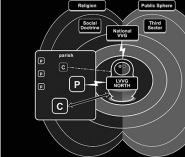
14 March 2024
Religion is widely recognized as the principal driver of volunteering for social solidarity and voluntary associations linked to religious institutions have been an important actor in the social services field in all Europe, regardless of the welfare regime. Now, recent research trends show that religious voluntary associations are under pressure: traditional life-long membership-based participation declines, intermediary corps are losing appeal, religious participation has plummeted. Counter-intuitively, Ksenija claims that religious volunteering can rely on an important resource to re-invent itself in the future. Starting from the results of her doctoral studies, published in a book (2023), Ksenija will explore the potential for furthering this line of research in comparative and interdisciplinary perspectives and share her experience of international practitioner and PhD candidate at the WWU - University of Münster in Germany.
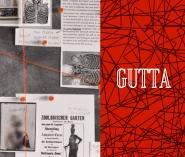
19 March 2024
This multi-layered project is centered on the person of "Amazon Gutta", a woman from the Yoruba people, performing with a group of "Amazons of Dahomey", which in September 1892, arrived in Prague. Gutta contracted typhoid fever here, and died after a few days. Her solemn funeral was a big spectacle, which took place on September 21, 1892 and was widely reported by press around the world. She was buried then in the Olšany cemetery. Two years later, her remains were excavated by Jindřich Matiegka and placed in the university collection, from where they found their way to the Hrdlicka Museum of Man, where they remain to this day.
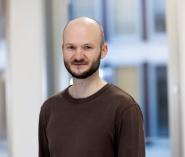
25 March 2024
The Iron Curtain is best known as a metaphor for the geopolitical separation between the Soviet Union and 'the West'. It is less well known as a technology of human displacement and ecological damage, for which forests were cut down or wetlands drained - even less so since the European Green Belt Initiative claimed the collateral ecological value of the former militarised border area. In the transboundary protected area of the Bavarian Forest (Germany) and Šumava (Czechia), a recent ecological project aims to restore wetlands, as these ecosystems have gained high ecological value for climate change mitigation, but also as drivers of biodiversity. Through material semiotic analysis, this case discusses what kind of wetland one can 'return to' in post-Iron Curtain landscapes. Emphasising the co-dependence of matter and meaning, the analysis highlights that the work of ecological remediation is actively engaged in processes of 'sign production' and 'sign destruction', here introduced as material signwork. The act of returning carries with it not only meanings of bodily movement, but also the 're-mediation' of the delicate histories of exclusion, dispossession and ecological damage.
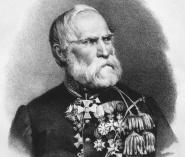
12 April 2024 – 13 April 2024
This presentation will introduce the research project “Decolonizing Ethnographic Museums in Central Europe”, a two-year project funded by the FOND Junior Programme at Charles University and at the Department of Social and Cultural Anthropology. The project focuses on the decolonization strategies of three museums in Central Europe, including the Náprstek Museum of Asian, African and American Cultures in Prague, Czech Republic, the Weltmuseum in Vienna, Austria, and the Néprajzi Múzeum (Museum of Ethnography) in Budapest, Hungary. These museums differ in the size of their collections, their exhibition spaces, and the regional and global claims they make for their collections.
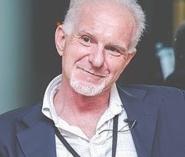
22 April 2024
The lecture will present how green infrastrucures and in general a multifunctionalised public and private green space in cities, can provide useful ecosystem services, generate savings and revenues, ensure mechanisms for dealing with the expleted planetary bounderies. We therefore will focus on wastewater reuse an recycling, urban and agricultural runoff management, rainwater harvesting, nutirents recovery from human and animal excreta, all managed by constructed wetlands, greenwalls, green facades, green roofs, bioretention trenches, bioswales, and other alternative ecological means.

23 April 2024
Let yourself be drawn into the soundscape on 23th April, and then let the rhythm set the pace. We invite you to a unique evening full of sounds and music, prepared especially for the Faculty of Humanities by the Berg Orchestra.
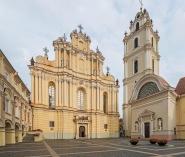
24 April 2024
The presentation outlines a research that focuses on the aesthetic-psychological relationship between Late Baroque churches and the natural elements of the place. The very idea of such a relationship is based on philosophical and Baroque theoretical arguments. It is the approach of architectural phenomenology that enables one to research this theme. Theoretical and practical ways have been opened up by Christian Norberg-Schulz, who, however, has not provided a precise practical tool. As a result, a combined contextuality method is being developed, incorporating several methods from architectural phenomenology. A pilot research of 11 churches, together with their natural environment in the Grand Duchy of Lithuania, in Trakai Voivodeship, has been carried out. This research has highlighted common specific features suggesting the landscape as an important factor shaping the expression of Late Baroque architecture.
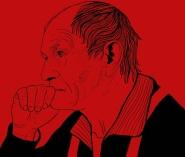
25 April 2024 – 27 April 2024
Hrabal is a synonym for idyll, at least for most of society, which perceives Bohumil Hrabal's works mainly through film adaptations. But his work has a more hidden and surprisingly far more abundant aspect: non-idyllicity. Why this feature of Hrabal's texts appeals more to foreign readers will be discussed by experts or translators of his books from France, Japan, Germany, or Poland, where he is still one of the most-read authors. They will be joined by leading experts on Hrabal's work from Czechia.
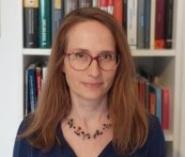
25 April 2024
What is discourse analysis and what are its most important assumptions? What is critical discourse analysis? How can discourse analysis be used in studies on music and society? These are the most important questions around which the lecture will be focused.
Barbara Jabłońska is an associate professor at the Institute of Sociology of the Jagiellonian University. Her research interests focus, among others, on issues related to the theory of culture and art, communication theories, and methods of qualitative research. She deals in particular with the issues of the sociology of music, media communication, and the public sphere, as well as discourse analysis.

7 May 2024
We invite you to a brunch for expat women scientists working in Czech research institutions. The guest speaker at the event will be Zsófia Csajbók, who works at the Faculty of Humanities as an Assistant Professor at the Department of Psychology and Life Sciences. The Brunch is organised by the NKC - Gender and Science and all women researchers across disciplines are invited. Registration is required for the event.
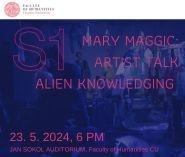
23 May 2024
FHS cordially invites you to a public event Mary Maggic: Artist Talk. Alien Knowledging, in the FHS UK Jan Sokol Auditorium on 23 May 2024 at 6:00 pm. This talk will provide a glimpse into the artistic practice of one of the key contemporary posthumanist feminist manifestos, Xenofeminism, which advocates the exploration of the potential of technology to achieve gender liberation. Exploring the alienation found in our bodies, environments, and molecules, the event will delve into artistic practice of Mary Maggic, who often uses biohacking as a Xenofeminist practice of care that serves to demystify the invisible lines of molecular biopower. The event will begin with a welcome by Dr. Denisa Tomková (FHS), an introduction to the project by Zai Xu (SVĚTOVA 1), and will be followed by Mary Maggic’s artist talk.

3 June 2024 – 4 June 2024
The workshop aims to bring together scholars focusing on theoretical, methodological, and practical aspects of biographical research (mainly) set in Central and Eastern European countries and to initiate their discussion with key figures in the biographical network: Professor Hans Renders and Doctor David Veltman, both from the Biography Institute at the Faculty of Arts, University of Groningen, Netherlands. The goal is to discuss general topics as well as (potential) regional specifics.
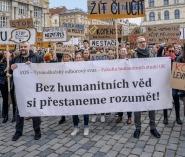
3 June 2024
At its meeting on 24 May, the Academic Senate of Charles University supported the upcoming protest action System Collapse!, which aims to draw attention to the imminent instability of Czech higher education due to possible budget cuts for the education sector. The demonstration will take place before the Chamber of Deputies debates on the state budget for 2025. The rally will take place on Monday, 3 June, on Jan Palach Square at 16:00, where opening speeches will be given. It will then pass by the Office of the Government, the Ministry of Finance and the Ministry of Education, Youth and Sports.
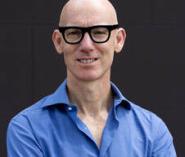
10 June 2024
The lecture reconstructs and explores how the construction of armed conflict as a legitimate practice of state violence was severed from genocide during the codification of genocide in law in the late 1940s and since. This distinction was entrenched in the postcolonial conflicts in Africa and Asia in the 1960s and 1970s, and has sedimented in the international law being applied in the Israel-Palestine war today, as the ICJ proceedings reveal. The distinction allows any state to justify its action as in terms of military necessity despite its seemingly genocidal consequences. Taking the approach of the history of concepts, this paper reveals the instability of this distinction and the purposes it serves.
A. Dirk Moses is the Anne and Bernard Spitzer Professor of International Relations at the City College of New York. He is the author of the books German Intellectuals and the Nazi Past (2007) and The Problems of Genocide: Permanent Security and the Language of Transgression (2021).
The lecture is organised by Department of Political Science, Faculty of Arts, CU and Department of Social and Cultural Anthropology, Faculty of Humanities, CU.

13 June 2024 – 15 June 2024
How is history ideologised and the creation of myths of the exceptionality of individual states and nations such as the USA, Israel, the Soviet Union or North Korea? And what role does political interest and propaganda play in such processes? How is historical memory related to national, religious or gender identity? And how does it relate to migration? The international interdisciplinary doctoral conference entitled Rewriting the History: Changing the Reading of the Past will seek answers to these and other interesting questions. The event is organized by the Department of Historical Studies of the Faculty of Humanities of Charles University, at the faculty headquarters and online on the 13th-15th. June 2024. The main expert guarantor of the conference is Dr. Alena Marková.

21 June 2024
We invite you to the final conference of the international project PERHOUSE Enhancing Personal and Household Services in Europe: Lessons from Central and Eastern European Countries, which will take place online on Friday, June 21, 2024, from 9:30 a.m. to 12:30 p.m.
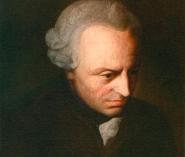
24 June 2024 – 25 June 2024
What was the influence of Immanuel Kant's thought on later philosophy of art and aesthetics and the perception of beauty in general? On the occasion of the 300th anniversary of the birth of the Enlightenment philosopher from Königsberg, the Faculty of Humanities will host an international conference entitled After Kant: What do art and literature owe to Kant? Ian Alexander Moore of Loyola Marymount University in Los Angeles and James Reid of Metropolitan State University of Denver will deliver keynotes at the conference. Associate Professor Aleš Novák from the Department of Philosophy is organizing the event on behalf of our faculty.

29 August 2024 – 30 August 2024
At the end of August, the Faculty of Humanities will host an international conference on military historical reenactment entitled Military Reenactment, Military Heritage, and Historical Conflicts and Traumas in Czech Lands. "This is the first-ever professional event in Czechia on the topic: the so-called reenactment studies, well established in the Anglo-Saxon academy, are still in their infancy in the Czech environment. The activities and publications associated with our GAČR project 'History and culture of contemporary Czech military re-enactment in an interdisciplinary perspective' are changing this situation," says Petr Wohlmuth, the event organiser. Passive participation in an audience is possible at the conference. However, it is necessary to register at Petr.Wohlmuth@fhs.cuni.cz.
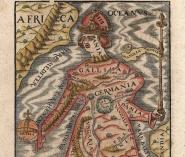
2 September 2024 – 3 September 2024
How can we look at the "other" in different historical periods? Faculty of Humanities PhD candidates invite you to a workshop on various representatives of "otherness" which will take place on 2nd and 3rd September. You can find a workshop program(me) down below. Topics of all papers cover the otherness and you can look forward to topics such as witches, tuberculosis, postmodern hermeticism, representation of African otherness in modern Czech travelogues and others. All faculty students are kindly welcome to the workshop.
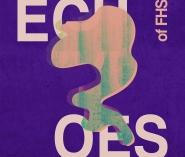
3 October 2024
The Students of FHS UK club cordially invites you to the "Echoes". The Faculty of Humanities will be filled with the echoes of summer and the June FHSfest, as well as music and poetry. Come and enjoy the exhibition or chat around the campfire.

7 October 2024
On Monday, October 7, there will be an opportunity to open the new swap at FHS together. In addition to the long-standing opportunity to bring your own clothes, dishes, and other items, there will be a crochet workshop on site that day for beginners and advanced. Equipment will be on site. There will also be an opportunity to learn about the theory of circular economy in a short and intense talk by PhD student Varvara Borisova, and we will be visited by FHS Dean Vera Sokolova for an introduction. Along with the Echoes of FHSfest, there will be a walkthrough the artworks on display in the faculty atrium, and the afternoon programme will be rounded off with two evening concerts by Drozd and Hyjé in the Jungle, where we will then dance by the fire with Pučmeloud.
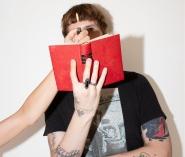
7 October 2024
The first meeting of the Feminist Reading Group on 7 October will be a special one: at 7 pm in the room 0.32 it will be followed by a public lecture and a performative reading by poet Natalie Mariko, current Garage Gallery resident, from her forthcoming book God of Knuckles. On literary voice, poetics and the dissolution of memory.
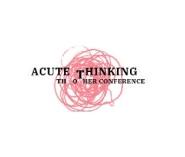
11 October 2024 – 13 October 2024
Graduate students of the study programme Deutsche und Französische Philosophie at the Faculty of Humanities organise a summer school at FHS (room 1.21) on the topic of New Materialism in Theory and Practice (in German) together with participants from Christan-Albrecht Universität, Kiel and Bergische Universität Wuppertal. Over two semesters, students at these universities have formed reading groups in this new field and will present and discuss their work together. Keynote lectures will be given by Dr Dagmar Lorenz-Meyer (FHS), Prof Hans Rainer Sepp (FHS), Prof Christian Thies (Universität Passau). The event will be held in German.

11 October 2024
The Academy of Fine Arts & The Faculty of Humanities are hosting a talk by Reza Negarestani, one of the leading thinkers of our time. Negarestani has not only popularized theory-fiction (Cyclonopedia) but also developed a vast neo-rationalist project on intelligence. In his first-ever lecture in Prague, Negarestani will outline his program of (general) intelligence, as featured in Intelligence and Spirit. Negarestani's lecture will be complemented by a shorter position paper from Václav Janoščík. Mohammad Salemy will moderate this discussion.
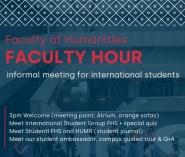
30 October 2024
Faculty Hour - an informal meeting with our student organisations, student ambassadors and other international students. Come and get to know each other, find out about extra-curricular activities and ask about anything you can think of after your first few weeks of study.
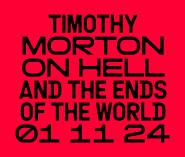
1 November 2024
For the first time in Czechia, Timothy Morton will appear on 1 November ina live teleconference at the Jan Sokol Auditorium of the Faculty of Humanities of Charles University in Prague and at the Inspiration Forum of the Ji.hlava International Documentary Film Festival. Here they will present their new book Hell: In Search of a Christian Ecology and offer a lecture on the climate “hell that is not the end of the world” and the unexpected combination of ecology and Christianity against the climate crisis.

4 November 2024
FHS will host a screening of Writing the Time Lag, an experimental documentary by Taiwanese artist Lee Tzu Tung, along with a short discussion afterwards. The film is open to all students and faculty staff.

4 November 2024
The Berg Orchestra returns to FHS with another program and a truly monstrous one at that. "This is not a composition. It's a monster. But so beautiful!" Enno Poppe, composer and conductor of its world premiere, said of The Fabrication of Light, which will be performed in our atrium on November 4.
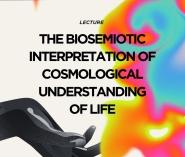
11 November 2024
On 11 November, an excellent young researcher from the University of Bologna, Nicola Zengiaro, will visit Prague. He will come to FHS with a lecture The Biosemiotic Interpretation of Cosmological Understanding of Life.
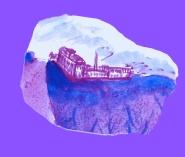
13 November 2024 – 15 November 2024
Campus Hybernská will host an international workshop called Punish or Rehabilitate through Work: It will focus on various early 20th century institutions such as correction, reformatory, forced labour colony, disciplinary labour camp, etc. were intended to serve as re-educational facilities for those who deviated from middle-class norms of "decent behavior" and "proper work." Dr Sigrid Wadauer from the University of Vienna will have a keynote here named (Il)legitimate Means of Sustenance? Variations, Hierarchies, and Differences in Work and Livelihood and the Spectrum of Possible Consequences. .

3 December 2024 – 4 December 2024
A conference on phenomenology will be held at the Akademické konferenční centrum. It is organised in cooperation with the doctoral colleges of the Universities of Wuppertal and Côte d'Azur, the Institute of Philosophy of the CAS and the FHS UK. The individual papers deal with the phenomenology of the world, the environment in which we live and nature. Filip Borek, Juan José Rodriguez, Thérèse Gräff and Dmitrii Reznikov, PhD students of the Deutsche und französische Philosophie programme, will be speaking from the FHS. Please see the attached conference program for the presentations.

16 December 2024
Do you feel safe? The central question for the documentary poem The Giverny Suite was posed by its author Ja'Tovia Gary to many African American women on a New York City street. The audiovisual result of this questioning, which recently appeared at MoMA in New York, will be presented by the artist to students and interested members of the public at FHS in December.
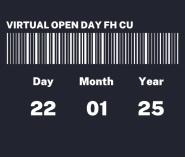
22 January 2025
Are you interested in interdisciplinary studies of humanities and social sciences in Prague? Join our Virtual Open day to explore student life at our faculty from the comfort of your home and have a chat with us! A Virtual Open day is a great opportunity for you to explore our programmes BA Liberal Arts and Humanities, MA Gender Studies and MA German and French Philosophy, and find out why the Faculty of Humanities is a fantastic place to study and research.
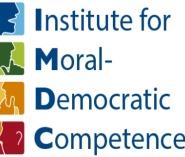
30 January 2025 – 31 January 2025
At the end of January, an international conference and interdisciplinary symposium on moral competence in medicine will take place. Dr. Anette Jedličková from the Department of Philosophy represents FHS in the organizing committee. The program will offer different perspectives on ethics and morality in health care and can be found below in a separate document.
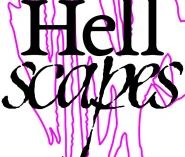
28 February 2025
We cordially invite you to a guided tour of the unique site-specific and virtual exhibition Hellscapes. On Art, Technology and Loneliness, which will be presented by its curator Václav Janoščík at the Faculty of Humanities on Friday, 28 February at 14:30 (in English). Come and walk with us through the building, in whose corners lurks a hellish poetry!
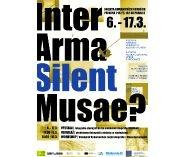
6 March 2025
We cordially invite you to the opening of the exhibition Inter Arma Silent Musae? and a discussion to follow. We look forward to seeing you on 6 March at 17:30 in the lower atrium of the FHS UK building.
Inter Arma Silent Musae?
Whether muses are really silent in war, we will debate with art photography students from the Kyiv National University of Culture and Arts, who will present the works of their studio together with their supervisor, Professor Vladimir Kukorenchuk. Photography students from FAMU in Prague have also accepted our invitation. The discussion will be held in English.
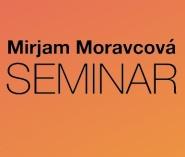
14 March 2025
This lecture offers an ethnographic exploration of contemporary North American Black music scenes with particular emphasis on artists influenced by the philosophical and aesthetic visions of space jazz pioneer Sun Ra. Drawing from extensive fieldwork and his scholarly expertise on Sun Ra’s ideology and axiology, Dr. Thomas "Bushmeat" Stanley examines how futurity and hybridity manifest in current Black musical innovation. The presentation will highlight how improvisation serves as a method of engaging with "historical epochs that have yet to begin" and activates affective dimensions of historical flow through sound. Stanley's unique perspective is informed by his diverse experience researching P-Funk, Garifuna musical traditions, and Butch Morris's compositional methodologies, providing a rich contextual framework for understanding the cosmic continuum of Black musical expression.
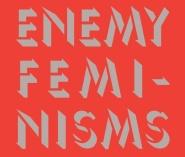
17 March 2025
The Faculty of Humanities is pleased to announce an evening with international scholar Sophie Lewis. A talk and discussion with Sophie Lewis on her new book Enemy Feminisms. TERFs, Policewomen, and Girlbosses Against Liberation, led by Denisa Tomková, will take place on 17 March 2025 at 5pm in the FHS auditorium. In a time of rising fascism, constant attacks on reproductive justice, and violent transphobia, Lewis’s new book offers the vision of feminist world-building we need through discussions of hostile feminisms, from 19th-century imperial feminists and police officers to today’s anti-abortion and TERF feminists. Judith Butler said of the book: “Where would we be without Sophie Lewis? In a more impoverished political world. This book is mandatory reading for anyone interested in a rough and compelling vision of the feminist past, present, and future. Honest, brutal, historically comprehensive, and brilliant.”
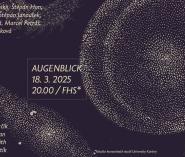
18 March 2025
Accept our invitation to the traditional concert of chamber compositions by the HAMU Composition Department, but this time in an unconventional setting - in the beautiful hall of the Faculty of Humanities of the Charles University. Sound spreads through space in time. Without space and time there is no sound. To capture isolated glimpses of the existence of sound in space, to stop them in the imagination, to give them a piece of new attention, to listen to them from different sides and perspectives...
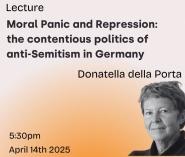
14 April 2025
Come to a lecture by a world-renowed sociologist, co-organized by the Department of Sociology of the FHS CU with the Initiative for a Critical Academy. Donatella Della Porta will lecture on moral panics, panic entrepreneurs and the repression of social movements, using the German protests against Israel's advance in Gaza as an example.

16 April 2025
For more information click here.

23 April 2025
We invite students and employees to an event held to celebrate the Earth Day. Together, we will build several insect hotels to place around the Faculty of Humanities. The event also includes a lecture about Insects in the City.
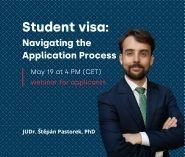
13 May 2025
Join us to ensure you’re well-prepared to complete the application process smoothly and efficiently!
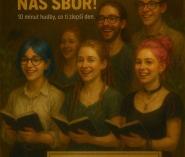
19 May 2025
Enter the upcoming exam period with an uplifted spirit. A performance by the choir from the Introduction to Choral Singing course under the direction of Mark Valášek can help. The pieces to be performed are Cantate Domino (Pitoni), Ave verum corpus (Mozart), Jazz Mass - Kyrie (Chilcott) and Jede sedlák do mlejna (Krček). The ten-minute performance will take place on Monday, May 19 at 11:20 a.m. in front of the auditorium. Students and faculty and staff are cordially invited.
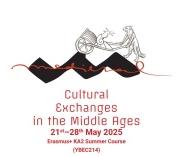
21 May 2025 – 27 May 2025
In collaboration with the National Library, FHS is organizing a summer school called Cultural Exchanges in the Middle Ages. The summer school aims to show the Middle Ages as a time, where stories and manuscripts circulated and ideas were transformed. The morning lectures are open to everyone. You can see what they will be about in the schedule attached below.
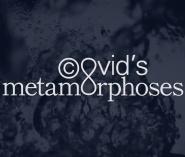
2 June 2025
A talk by Prof. Bernd Herzogenrath (Goethe Universität, Frankfurt am Main) consists of two parts: in the first, he is attempting to delineate a "cultural logic of infection" based on Deleuze & Guattari’s distinction of "filiation" and "infection." In a second part, professor Herzogenrath will present a "series" from his international pandemic arts project ©ovid’s metamorphoses, linking play and infection to an artistic assemblage. Joy is an act of resistance (in both the political and medical sense).
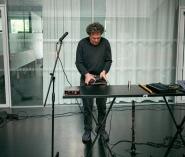
6 June 2025
The culmination of the Music from Nature summer school with university teacher and artist David Rothenberg. The concert will feature the participants of the summer school, presenting the outputs of their week's work as well as David Rothenberg himself, who has "played" with cicadas and whales in the past. The summer school is organised by Zuzana Jurková and Oldřich Poděbradský.
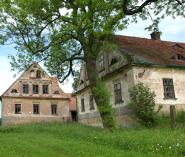
27 August 2025 – 29 August 2025
At the end of August 2025, the Faculty of Humanities will host a conference on the impact of depopulation in Europe. It will focus on how the depopulation of peripheral rural areas and urban centres affects cultural and natural heritage in the broadest sense, as well as the relationship between humans and nature. We are accepting proposals for papers on various aspects of depopulation in both urban and rural areas, focusing on cultural heritage, cultural transmission, relationship to place, memory, demographic anxiety or the effects of demographic change on local communities.
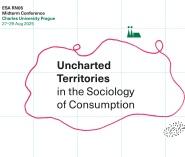
27 August 2025 – 29 August 2025
The Faculty of Humanities will host the international midterm conference of the ESA Research Network RN05 Sociology of Consumption on 27-29 August 2025.
The conference Uncharted Territories in the Sociology of Consumption focuses on new perspectives in the study of consumption, seeks to deepen the understanding of the dynamics of consumer behaviour in contemporary society, and emphasises the Eastern European dimension and research on understudied areas. The aim is to stimulate an interdisciplinary debate on innovative methodologies and theories in the sociology of consumption.
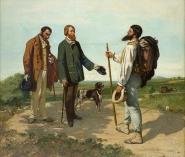
4 September 2025 – 5 September 2025
The history of emotions helps us understand human experience by showing how feelings influence behavior, decision-making, and social interactions. Faculty of Humanities PhD candidates organizes a workshop on role of feelings in shaping everyday life in history. The workshop will take place on 4th and 5th September 2025.
Charles University
Faculty of Humanities
Pátkova 2137/5
182 00 Praha 8 - Libeň
Czech Republic